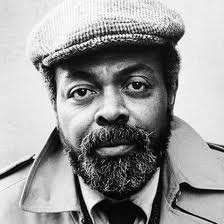In the “Eulogy” he wrote on the passing of poet Louis Reyes Rivera, reprinted by The Liberator Magazine, Amiri Baraka described what it means to lose a poet: “If you know where the light is and it goes out it frightens and pours ice through you. Like somehow you got put out in the cold and the darkness. There is no one I fear losing like the poets. Not just because we do that, but it means there is one less trusted mind and soul in the world. It is a loneliness that jumps us remembering the someone like Louis Reyes Rivera whom we knew to speak the truth. In a world full of lies and surrounded by death and darkness, someone who would bring that wondrous light and truth to us, that we could count on to do that.” With Baraka’s passing yesterday, we lost a poet, activist, playwright, critic, and visionary whose words illuminated and scorched collective consciousness.
Baraka was never safe. His poetry wasn’t safe to read, and it definitely wasn’t safe to be in the audience for one of his plays. To read or listen to his writing is to be upset because his works make us see ourselves. His words should continue to upset and unsettle us because they are dangerous. One of the most remarkable aspects of Baraka’s genius was to understand and reflect what audiences needed or wanted from him. He played the New York Times and other media outlets throughout the 1960s and 70s to bring attention, and subsequently funding, to black causes through a canny understanding of his own infamous public perception. He opens one of his best-known poems, “Black Art,” with a call to reimagine the purpose of poetry for a new era marked by death, violence, and the unblinking recognition of America as a destructive force in the world. He writes, “Poems are bullshit unless they are / teeth or trees or lemons piled / on a step.” Moreover, when Baraka wrote, “Art is method” in his necessary essay, “The Revolutionary Theatre,” he was not echoing a platitude, he was marking a dynamic shift, both in his own career and in the conceptualization of what art could do to provoke revolution and change people’s lives.
As the founder of cultural institutions, first the Black Arts Repertory Theater School in Harlem, then Spirit House in Newark, Baraka fostered the freedom to create. He was a satellite circling and broadcasting some of the most talented artistic and musical geniuses of the twentieth century. His name is often used as a synecdoche for a movement, justly or not, that includes Sonia Sanchez, Ed Bullins, Jayne Cortez, Sun Ra, Archie Shepp, Haki Madhubuti, Albert Ayler, Larry Neal, and so many others who worked alongside him to instantiate a movement of Black Fire. Among his contributions to the black liberation struggle was the ability to articulate a call to action and provoke new thinking. Through his minute attention to the local—the city street, the individual’s experience, and the body—he theorized the nation and nationalism in ways few others did.
Baraka’s career was marked by and fulfilled a spirit of transformation. To transform oneself and to commit his life to social transformation so fervently, consistently, and boldly in the public eye for over five decades constituted a sustained act of bravery, integrity, daring, and included no small amount of playfulness and humor. As a critic of the United States, one of “Malcolm’s children,” as he would put it, he questioned quotidian forms of oppression and championed the strategies of resistance drama, poetry, and especially music provided Americans of color united in struggle.
In an energetic moment at the end of the Scene 1 in his 1964 Obie Award-winning play, Dutchman, the antagonist, Lula says of Clay, the play’s protagonist, “May the people accept you as a ghost of the future. And love you, that you might not kill them when you can.” These lines strike me now as revelatory of the kind of work Baraka would do throughout his career to challenge and provoke readers. Dangerous images set to alluring rhythms and the musical sound of his voice disrupted the gaze of power and privilege. Undermining the powerful through the joyful utterance of black expressions goes a long way to explain why and how Baraka continued to unsettle so many for so long. To lose a poet is a hard burden for the world to bear, but this transformation will be aided by a canon of fire and Spirit.
Elizabeth Pittman earned her Ph.D. in literature from George Washington University. She teaches courses in Black American literature, American literature, contemporary literature, and writing in the D.C. metropolitan region. Her scholarship has appeared in the journal Culture, Theory and Critique.

